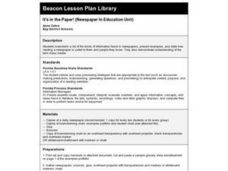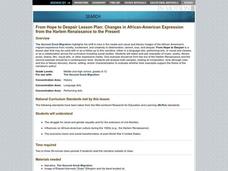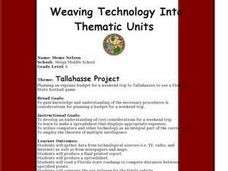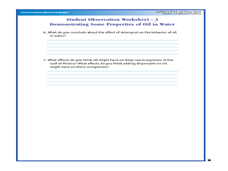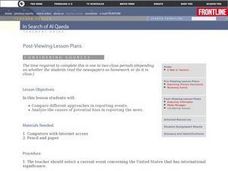Curated OER
Medium Studies
Students consider the evolution of newspapers. In this current events lesson, students investigate changes in newspaper production as they visit selected websites to educate themselves about the topic. Students then discuss...
Curated OER
It's in the Paper! (Newspaper In Education Unit)
Fourth graders brainstorm a list of the kinds of information found in newspapers, present examples, and state how reading a newspaper is useful to them and people they know.
Curated OER
SPEAK NO EVIL
Students explore different means of communication by looking at magazines, newspapers, formal and informal language.
Curated OER
I Want to Be a Beachcomber
Students, in teams, examine the advantages and disadvantages of reading the news from the print format or from the online newspaper format. Students compare and contrast a printed newspaper with an electronic version using Inspiration....
Curated OER
Freedom of Expression in Special Places
Young scholars identify at least three places presenting First Amendment problems. They analyze how the First Amendment applies to school newspapers. Students argue for and against limiting First Amendment rights in school. They...
Curated OER
Fact and Opinion Detectives
Third graders see how to distinguish facts from opinions in a child's news magazine. After a lecture/demo, 3rd graders utilize a sample story and a worksheet which gives them practice in distinguishing fact from opinion.
Curated OER
Target Audience
Students explore and describe various persuasive tools used in advertisements, analyze advertisements provided by teacher, and identify target audiences. Students then work in groups to find advertisements aimed at assigned target...
Curated OER
Comparing the Ancient and Modern Olympics: A Venn Diagram
Students compare and contrast today's Olympic Games to those held in ancient Greece. They read newspapers, conduct Internet research, watch TV coverage of current Olympic Games and organize their findings on a Venn diagram.
Curated OER
Students in Article Writing Shocker!
Learners examine newspapers to identify the most interesting stories. They discuss the purpose of a headline and complete a worksheet. They write a paper on the differences of writing for different types of publications.
Curated OER
Surveying Society's Attitudes About Crime
Students investigate how crime reporters do their jobs and how the news of crime gets reported.
Curated OER
Using Photography To Enhance A Story
Students read text and study examples of good usable photography for newspapers. They see how to crop photos for maximum effect, and to better tell the story. They tell a sports story by choosing the best and fewer photos that have the...
Curated OER
Dealing with Conflict
Young scholars identify types of conflict and various responses to anger. In this character education lesson plan, the teacher introduces definitions of conflict and anger responses. Students find examples of types of conflict in...
Curated OER
Making Headlines
Students consider their personal opinions about the news and politics, read about the public relations drive behind the 2004 presidential election, and gather information for a press release promoting either Mr. Bush or Mr. Kerry.
Curated OER
Urban Concentration and Racial Violence
Students research one of the many urban race riots in U.S. history, from the New York City riots during the Civil War to the "Red Summer of 1919" or the hate-strikes of 1943. They present their findings in the form of a newspaper's front...
Curated OER
EARLY COLORADO ADVERTISING
Students investigate the history of advertising in Colorado.They analyze newspapers and advertisements putting them into different categories. Students question the content to develop higher order thinking skills.
Curated OER
Tallahassee Project
Sixth graders gather information from technological sources such as TV, radio, and Internet as well as from newspapers and maps and produce a final printed report. They use the data to create a spreadsheet and read a Florida state...
Curated OER
Oil Floats, Right?
Students examine the properties in oil in water. In this mixture lesson, students read about the Lophelia II 2010: Cold Seeps and Deep Reef Expedition and look at images of deep sea ecosystems. They experiment or participate in...
Curated OER
Journalism: Potential Bias
Students investigate a current event involving the United States from different journalistic viewpoints. They compare a Western newspaper with one from the Middle East and submit written evaluations noting agreements and disagreements in...
Curated OER
"Journalism in Tennessee"
Students listen to headline from National Enquirer or other tabloid, listen to story "Journalism in Tennessee," compare and contrast connections between Twain's idea of journalism with present day journalism, define vocabulary, and...
Curated OER
Magazine Production
Analyze magazines as a class, looking carefully for the target audience, advertisements, and topics presented. Small groups then work as a publication team and receive a magazine that they have to "sell." Each individual has a different...
Curated OER
New York City Delights: The Taxi Cab
You set the rate! Step into the shoes of a taxi driver in New York City, and also pretend to be a person who uses taxis to get around town. The class will conduct collaborative research to learn about the history of taxis. Then, they...
Odyssey of the Mind
Odyssey of the Mind Curriculum Activity: Performing Arts
The classical arts have made a lasting impact on our society and your advanced learners get to find out why. The activity starts as the children create a list of the arts found in society, they discuss how these art forms impact their...
Curated OER
Exploring US Foreign Policy after WWII--The Cold War
Scholars explore U.S. Foreign Policy and Cold War ideologies adopted after WWII. They conduct Internet research on a topic or issue related to the Cold War Era, watch two films, and compose a time line and a multimedia presentation to...
Curated OER
Violence in Sports
Students explore the gratuitous use of violence in televised sports. They discuss sports they participate in, and the rules and consequences that relate to unsporting behaviour. They see if the same rules apply to professional athletes.



